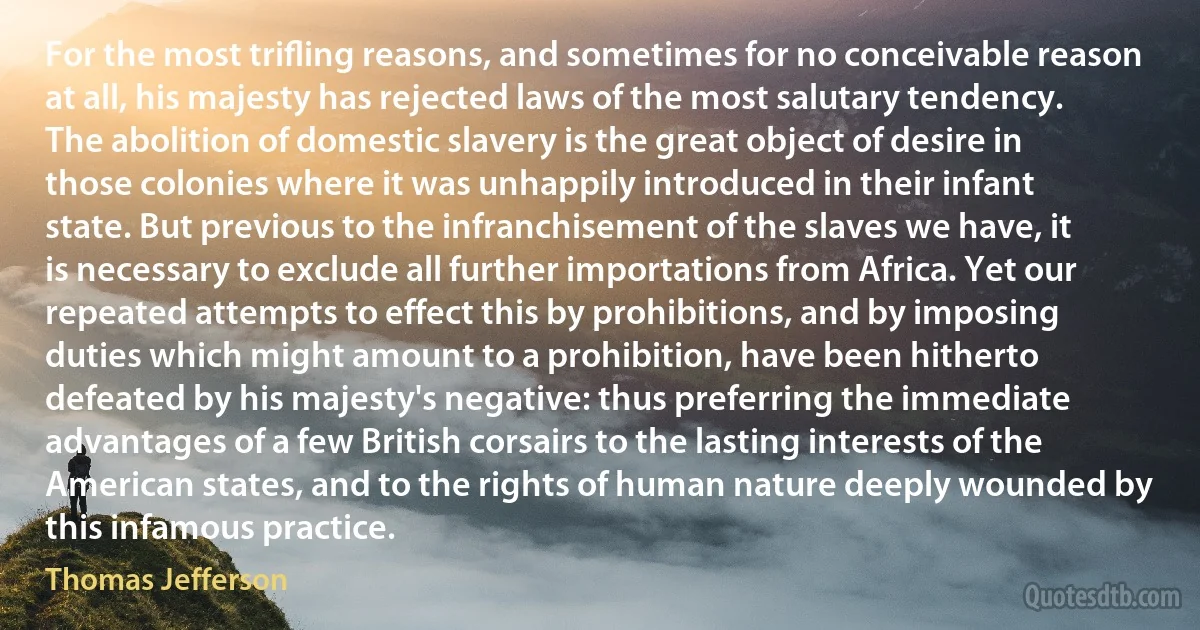
For the most trifling reasons, and sometimes for no conceivable reason at all, his majesty has rejected laws of the most salutary tendency. The abolition of domestic slavery is the great object of desire in those colonies where it was unhappily introduced in their infant state. But previous to the infranchisement of the slaves we have, it is necessary to exclude all further importations from Africa. Yet our repeated attempts to effect this by prohibitions, and by imposing duties which might amount to a prohibition, have been hitherto defeated by his majesty's negative: thus preferring the immediate advantages of a few British corsairs to the lasting interests of the American states, and to the rights of human nature deeply wounded by this infamous practice.
Thomas JeffersonRelated topics
abolition desire few great human infant lasting might nature necessary practice preferring reason state tendency thus yet Laws StatesRelated quotes
What, then, is the Constitution? I will tell you. It is not even like the British Constitution, which is made up of enactments of Parliament, decisions of Courts, and the established usages of the Government. The American Constitution is a written instrument full and complete in itself. No Court in America, no Congress, no President, can add a single word thereto, or take a single word threreto. It is a great national enactment done by the people, and can only be altered, amended, or added to by the people. I am careful to make this statement here; in America it would not be necessary. It would not be necessary here if my assailant had shown the same desire to be set before you the simple truth, which he manifested to make out a good case for himself and friends.

Frederick Douglass
Contrary to several conflicting stories, I got the name "Count" right in Kansas City in 1936 while at the Reno Club. I was known as Bill Basie at that time. One night, while we were broadcasting, the announcer called me to the microphone for those usual few words of introduction. He commented that Bill Basie was a rather ordinary name, and further that there were a couple of well-known bandleaders named Earl Hines and Duke Ellington. Then he said, "Bill, I think I'll call you Count Basie from now on. Is that all right with you?" I thought he was kidding, shrugged my shoulders and replied, "OK." Well that was the last time I was ever introduced as Bill Basie. From then on, it was Count Basie, and I never did lose that nickname. It's funny the way those things will stick.

Count Basie
[P]eople misunderstand Israel, and see it now in colonial, imperialist terms is because it's a unique event in human history. The British colonization of North America, New Zealand, Australia, the Dutch in South Africa, they came to places that they had never been to. That's colonialism. You put your people in there. You takeover. You marginalize the natives if you can. You may not succeed. In South Africa, that's colonialism. So they see the Jews arriving in what's called Palestine, and that's the parallel, the only one they understand. They can't put their heads around the fact that this is a people returning to their home. That they never gave up title to. They never gave up their longing for. It was repeated in their rituals three times a day, it wasn't like once a year, let's remember the homeland.

Charles Krauthammer
Right wrongs no man. If respect is had to majorities, the fact that only one-fifth of the population of the globe is white and the other four-fifths are colored, ought to have some weight and influence in disposing of this and similar questions. It would be a sad reflection upon the laws of nature and upon the idea of justice, to say nothing of a common Creator, if four-fifths of mankind were deprived of the rights of migration to make room for the one-fifth. If the white race may exclude all other races from this continent, it may rightfully do the same in respect to all other lands, islands, capes and continents, and thus have all the world to itself, and thus what would seem to belong to the whole would become the property of only a part. So much for what is right, now let us see what is wise.

Frederick Douglass
Through the means just specified, aided perhaps by others as yet undiscovered, man has been raised to his present state. But since he attained to the rank of manhood, he has diverged into distinct races, or as they may be more appropriately called sub-species. Some of these, for instance the Negro and European, are so distinct that, if specimens had been brought to a naturalist without any further information, they would undoubtedly have been considered by him as good and true species. Nevertheless all the races agree in so many unimportant details of structure and in so many mental peculiarities, that these can be accounted for only through inheritance from a common progenitor; and a progenitor thus characterised would probably have deserved to rank as man.

Charles Darwin
